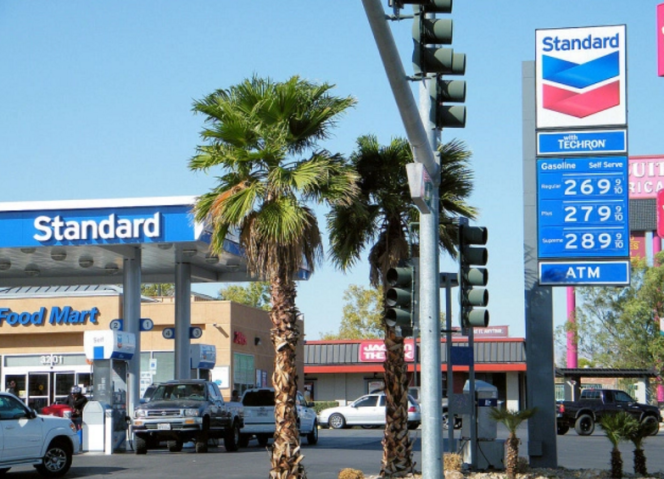The Chevron Corporation has pierced California’s soil and fouled its air for over 140 years. It will continue to do so—in California and many other places—but soon it will no longer direct its operations from here.
As many as eight Fortune 500 companies have left the state or merged into companies based elsewhere in just the past five years. Among them, Chevron is the largest, and the 15th largest nationally, with $300 billion in annual revenues. (Fifty-three Fortune 500 companies remain in the state, led by Apple.)
Founded in 1879 as the Pacific Coast Oil Co., Chevron is now moving its headquarters to Houston. Sure, this move is a blow to California’s ego. But, it’s a superficial one, ranking far below, say, the defection of a sports team. Jurisdictions take pride in their Fortune 500 companies, especially historic ones. But historic does not equal good.
If we account for the negative externalities of Chevron, we don’t get a behemoth with a $250 billion market cap. We get a scourge that has cost billions of dollars -- in costs for roads, healthcare, premature deaths, climate change mitigation, and more -- charged to taxpayers and to the general economy.
We get a holocaust with a body count on the order of a world war. (Add to that the actual wars that Chevron and its industry peers have instigated and fueled over the years.)
By some accounts, Chevron’s operations have caused over $50 billion in direct environmental and humanitarian damage in dozens of locations around the world. Many of those places don’t have a dime to spare, much less billions. Chevron has paid all of $286 million in damages and lawsuit settlements. And, shamefully, Chevron is responsible for this year's Supreme Court case that dramatically weakened the federal government's regulatory powers.
More broadly, is there any industry that has done more to ruin American cities than the oil industry? At least cars, for all their problems, provide people with direct, tangible benefits. I can knowingly use a car. I can enjoy a car. I cannot enjoy oil -- it is simply a means to an end, and a ghastly one at that. In dozens of countries worldwide, an oil (or “energy”) company is the largest company in the country. Humanity has sacrificed its quality of life to Chevron and its ilk.
Chevron's transgressions will not end with the move to Houston, but at least the blood will no longer be on California's hands.
I don’t want to hate on Houston. Obviously, a fossil fuel company benefits from locating there just as a movie studio benefits from locating in Los Angeles. Houston is not oblivious to the importance of sustainability.
And yet, it’s a flat, hot place whose Texan bravado often drowns out its vulnerability--even when it sometimes literally drowns. In Houston, you can produce and sell the equivalent of 1.3 billion tons of GHGs every day and think little of the consequences.
I can only imagine how sick Chevron execs must be of California environmentalists, California's laws, and California's landscape.
California isn't perfect--especially not its environmentalists. Policies they have promoted aren’t perfect and, in the case of CEQA, are sometimes counterproductive. But, our state generally respects the natural environment and wants to protect it.
Just look around—at mountains, beaches, rivers, and deserts—and the reasons are obvious. Chevron’s departure will cost some jobs, sure. And it symbolizes California’s unfriendliness to business. That’s a serious problem. We can no longer assume that we are so attractive that companies will be willing to pay the premium, in taxes, regulatory compliance, and cost of living that California exacts. That’s especially true in the post-COVID era.
But, California can compensate for Chevron’s loss—or, if you prefer—get its revenge on many ways.
In Chevron's absence, California can pursue sustainability goals--locally and globally--even more enthusiastically. It can speed the adoption of electric vehicles and renewable energy (which, on a good day, sometimes accounts for more than 100% of the state's energy).
It can nurture companies to develop new batteries, carbon capture technologies, more sustainable concrete, and a million other technologies to reduce the world's carbon footprint.
It can conserve our natural environment and reap the monumental economic benefits thereof.
And, it can continue the fight to reduce emissions from transportation, primarily by promoting density and reducing VMT. The economic and health benefits of widespread, well planned density can probably compensate for the loss of Chevron's tax dollars. Not to mention the aggregate reduction in expenditures on fuel.
So, Chevron, it’s been a gas. But, we can do a lot better. Don’t let the door hit you on the way out.
Josh Stephens is contributing editor to the California Planning and Development Report and a freelance writer, specializing in urban planning. Based in Los Angeles, Josh writes frequently for Planetizen, CommonEdge Collaborative, and InTransition, among others. His website is joshrstephens.net.






